Sustainability in Education: Analysis of IT Education in Australia
VerifiedAdded on 2023/04/03
|13
|3595
|190
AI Summary
This paper analyzes the impact of widening access to Australian higher education for IT professions on sustainability.
Contribute Materials
Your contribution can guide someone’s learning journey. Share your
documents today.
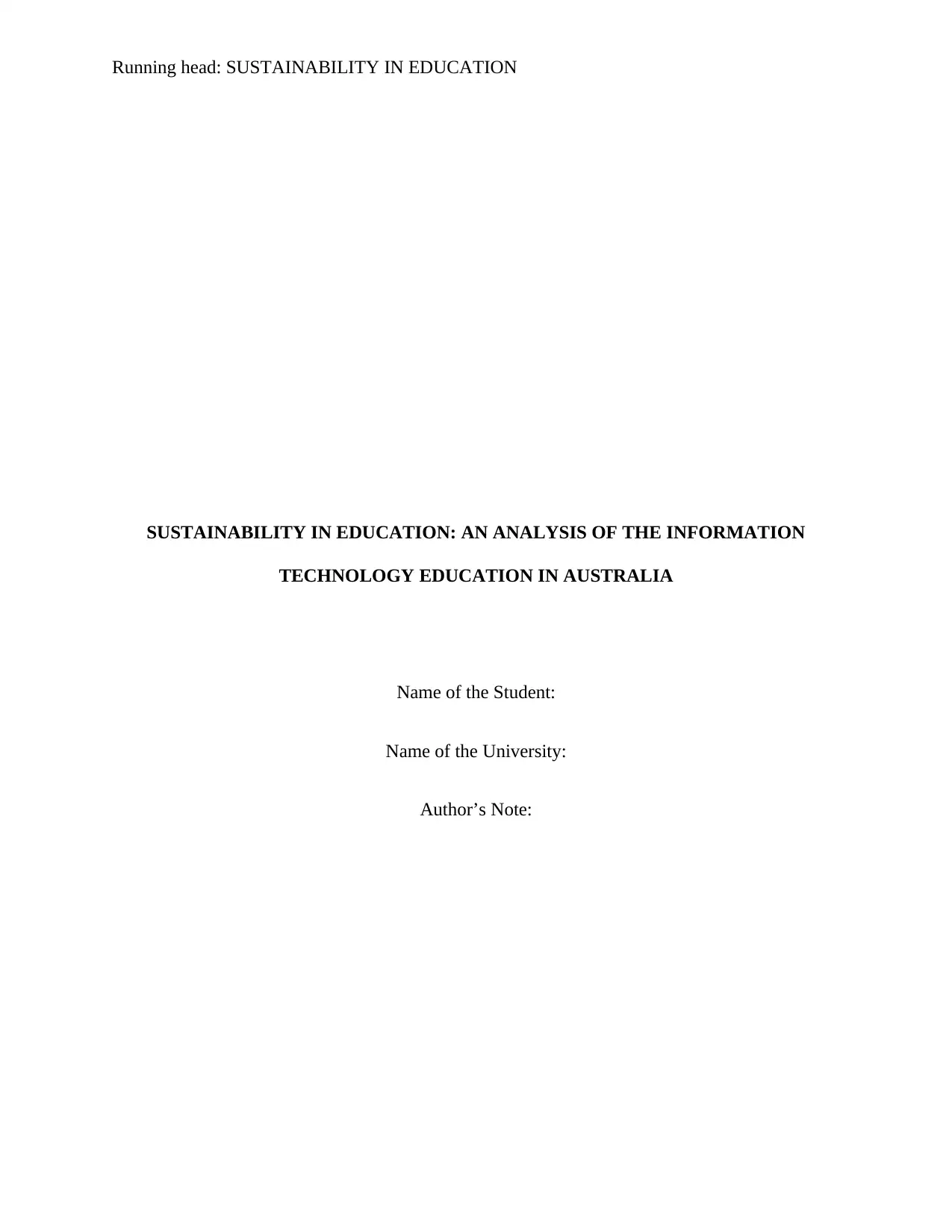
Running head: SUSTAINABILITY IN EDUCATION
SUSTAINABILITY IN EDUCATION: AN ANALYSIS OF THE INFORMATION
TECHNOLOGY EDUCATION IN AUSTRALIA
Name of the Student:
Name of the University:
Author’s Note:
SUSTAINABILITY IN EDUCATION: AN ANALYSIS OF THE INFORMATION
TECHNOLOGY EDUCATION IN AUSTRALIA
Name of the Student:
Name of the University:
Author’s Note:
Secure Best Marks with AI Grader
Need help grading? Try our AI Grader for instant feedback on your assignments.
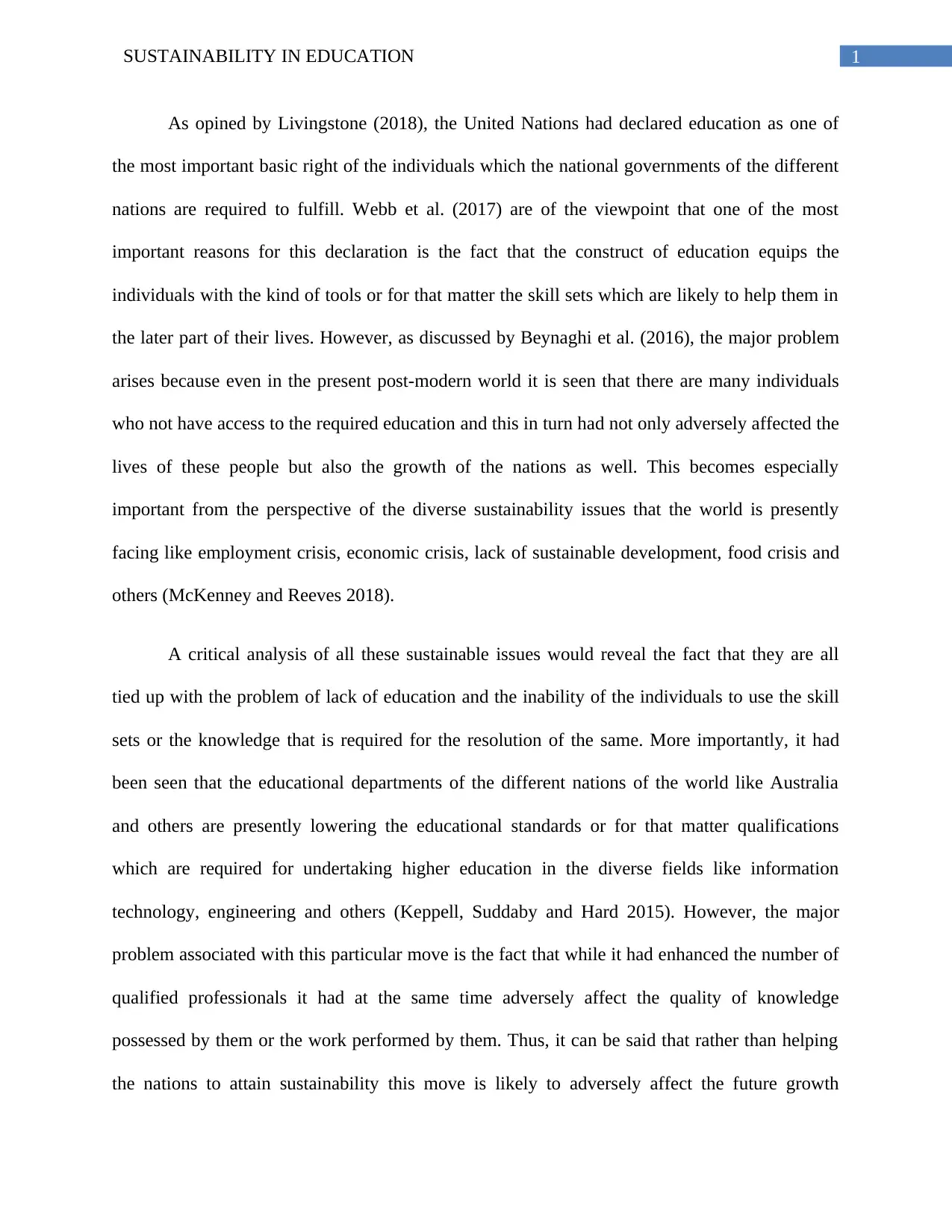
1SUSTAINABILITY IN EDUCATION
As opined by Livingstone (2018), the United Nations had declared education as one of
the most important basic right of the individuals which the national governments of the different
nations are required to fulfill. Webb et al. (2017) are of the viewpoint that one of the most
important reasons for this declaration is the fact that the construct of education equips the
individuals with the kind of tools or for that matter the skill sets which are likely to help them in
the later part of their lives. However, as discussed by Beynaghi et al. (2016), the major problem
arises because even in the present post-modern world it is seen that there are many individuals
who not have access to the required education and this in turn had not only adversely affected the
lives of these people but also the growth of the nations as well. This becomes especially
important from the perspective of the diverse sustainability issues that the world is presently
facing like employment crisis, economic crisis, lack of sustainable development, food crisis and
others (McKenney and Reeves 2018).
A critical analysis of all these sustainable issues would reveal the fact that they are all
tied up with the problem of lack of education and the inability of the individuals to use the skill
sets or the knowledge that is required for the resolution of the same. More importantly, it had
been seen that the educational departments of the different nations of the world like Australia
and others are presently lowering the educational standards or for that matter qualifications
which are required for undertaking higher education in the diverse fields like information
technology, engineering and others (Keppell, Suddaby and Hard 2015). However, the major
problem associated with this particular move is the fact that while it had enhanced the number of
qualified professionals it had at the same time adversely affect the quality of knowledge
possessed by them or the work performed by them. Thus, it can be said that rather than helping
the nations to attain sustainability this move is likely to adversely affect the future growth
As opined by Livingstone (2018), the United Nations had declared education as one of
the most important basic right of the individuals which the national governments of the different
nations are required to fulfill. Webb et al. (2017) are of the viewpoint that one of the most
important reasons for this declaration is the fact that the construct of education equips the
individuals with the kind of tools or for that matter the skill sets which are likely to help them in
the later part of their lives. However, as discussed by Beynaghi et al. (2016), the major problem
arises because even in the present post-modern world it is seen that there are many individuals
who not have access to the required education and this in turn had not only adversely affected the
lives of these people but also the growth of the nations as well. This becomes especially
important from the perspective of the diverse sustainability issues that the world is presently
facing like employment crisis, economic crisis, lack of sustainable development, food crisis and
others (McKenney and Reeves 2018).
A critical analysis of all these sustainable issues would reveal the fact that they are all
tied up with the problem of lack of education and the inability of the individuals to use the skill
sets or the knowledge that is required for the resolution of the same. More importantly, it had
been seen that the educational departments of the different nations of the world like Australia
and others are presently lowering the educational standards or for that matter qualifications
which are required for undertaking higher education in the diverse fields like information
technology, engineering and others (Keppell, Suddaby and Hard 2015). However, the major
problem associated with this particular move is the fact that while it had enhanced the number of
qualified professionals it had at the same time adversely affect the quality of knowledge
possessed by them or the work performed by them. Thus, it can be said that rather than helping
the nations to attain sustainability this move is likely to adversely affect the future growth
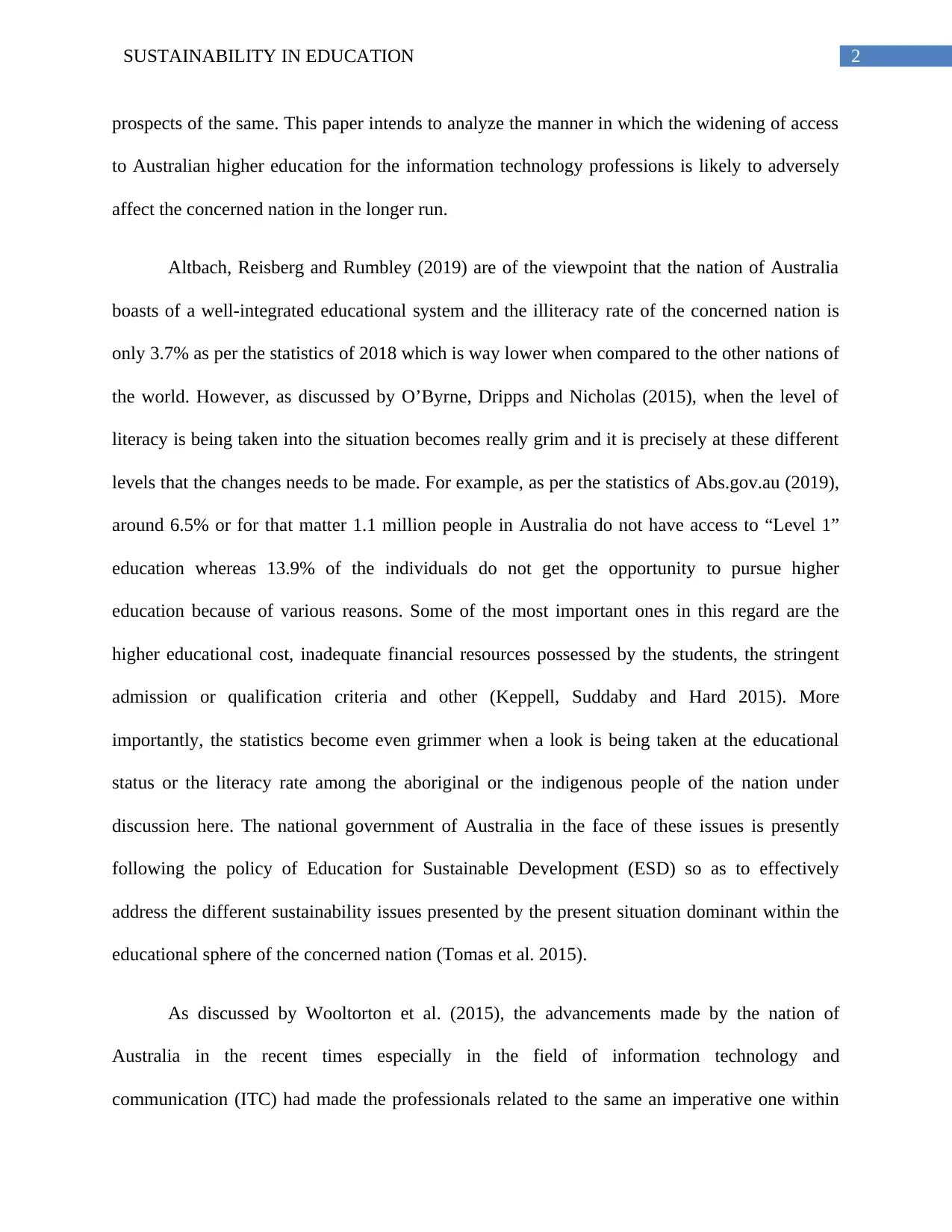
2SUSTAINABILITY IN EDUCATION
prospects of the same. This paper intends to analyze the manner in which the widening of access
to Australian higher education for the information technology professions is likely to adversely
affect the concerned nation in the longer run.
Altbach, Reisberg and Rumbley (2019) are of the viewpoint that the nation of Australia
boasts of a well-integrated educational system and the illiteracy rate of the concerned nation is
only 3.7% as per the statistics of 2018 which is way lower when compared to the other nations of
the world. However, as discussed by O’Byrne, Dripps and Nicholas (2015), when the level of
literacy is being taken into the situation becomes really grim and it is precisely at these different
levels that the changes needs to be made. For example, as per the statistics of Abs.gov.au (2019),
around 6.5% or for that matter 1.1 million people in Australia do not have access to “Level 1”
education whereas 13.9% of the individuals do not get the opportunity to pursue higher
education because of various reasons. Some of the most important ones in this regard are the
higher educational cost, inadequate financial resources possessed by the students, the stringent
admission or qualification criteria and other (Keppell, Suddaby and Hard 2015). More
importantly, the statistics become even grimmer when a look is being taken at the educational
status or the literacy rate among the aboriginal or the indigenous people of the nation under
discussion here. The national government of Australia in the face of these issues is presently
following the policy of Education for Sustainable Development (ESD) so as to effectively
address the different sustainability issues presented by the present situation dominant within the
educational sphere of the concerned nation (Tomas et al. 2015).
As discussed by Wooltorton et al. (2015), the advancements made by the nation of
Australia in the recent times especially in the field of information technology and
communication (ITC) had made the professionals related to the same an imperative one within
prospects of the same. This paper intends to analyze the manner in which the widening of access
to Australian higher education for the information technology professions is likely to adversely
affect the concerned nation in the longer run.
Altbach, Reisberg and Rumbley (2019) are of the viewpoint that the nation of Australia
boasts of a well-integrated educational system and the illiteracy rate of the concerned nation is
only 3.7% as per the statistics of 2018 which is way lower when compared to the other nations of
the world. However, as discussed by O’Byrne, Dripps and Nicholas (2015), when the level of
literacy is being taken into the situation becomes really grim and it is precisely at these different
levels that the changes needs to be made. For example, as per the statistics of Abs.gov.au (2019),
around 6.5% or for that matter 1.1 million people in Australia do not have access to “Level 1”
education whereas 13.9% of the individuals do not get the opportunity to pursue higher
education because of various reasons. Some of the most important ones in this regard are the
higher educational cost, inadequate financial resources possessed by the students, the stringent
admission or qualification criteria and other (Keppell, Suddaby and Hard 2015). More
importantly, the statistics become even grimmer when a look is being taken at the educational
status or the literacy rate among the aboriginal or the indigenous people of the nation under
discussion here. The national government of Australia in the face of these issues is presently
following the policy of Education for Sustainable Development (ESD) so as to effectively
address the different sustainability issues presented by the present situation dominant within the
educational sphere of the concerned nation (Tomas et al. 2015).
As discussed by Wooltorton et al. (2015), the advancements made by the nation of
Australia in the recent times especially in the field of information technology and
communication (ITC) had made the professionals related to the same an imperative one within
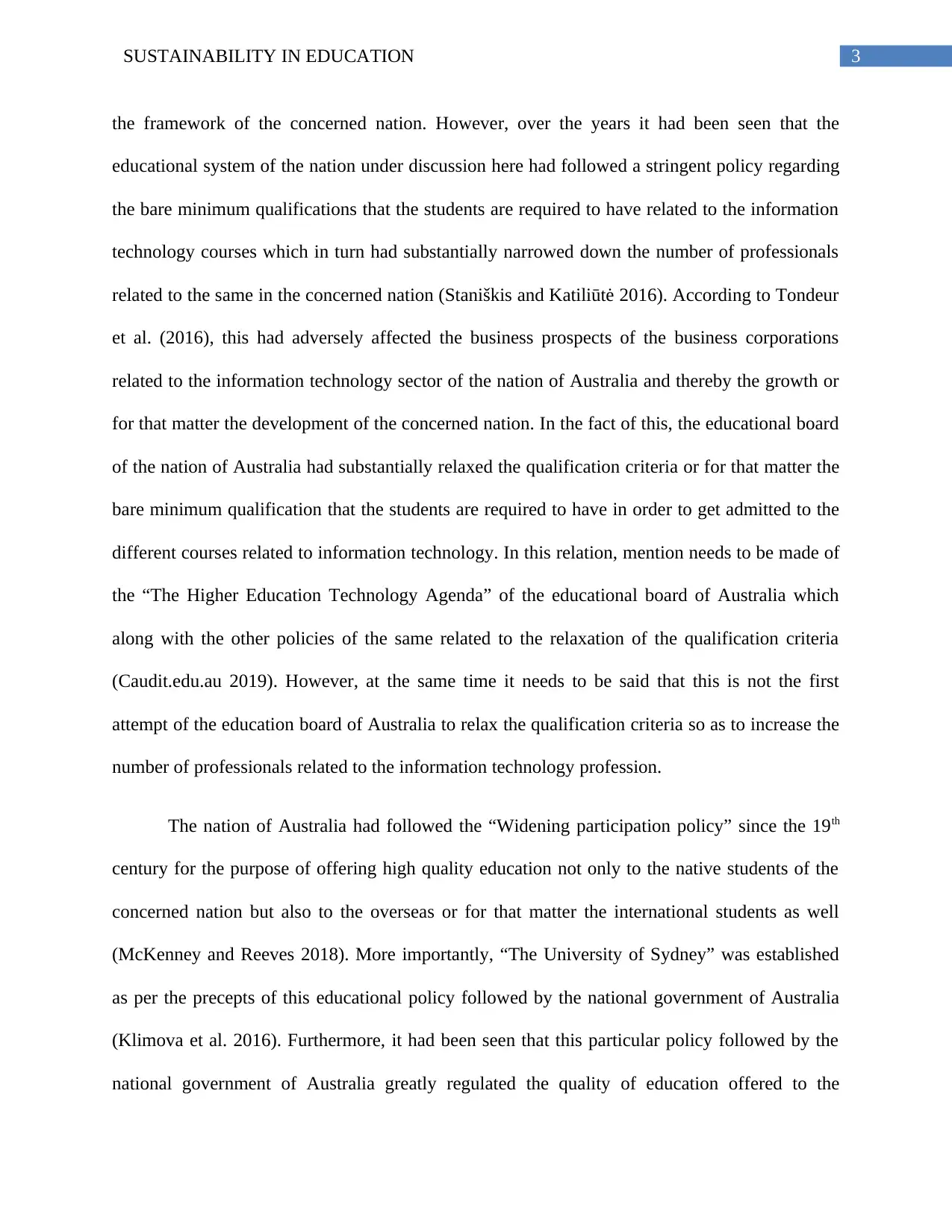
3SUSTAINABILITY IN EDUCATION
the framework of the concerned nation. However, over the years it had been seen that the
educational system of the nation under discussion here had followed a stringent policy regarding
the bare minimum qualifications that the students are required to have related to the information
technology courses which in turn had substantially narrowed down the number of professionals
related to the same in the concerned nation (Staniškis and Katiliūtė 2016). According to Tondeur
et al. (2016), this had adversely affected the business prospects of the business corporations
related to the information technology sector of the nation of Australia and thereby the growth or
for that matter the development of the concerned nation. In the fact of this, the educational board
of the nation of Australia had substantially relaxed the qualification criteria or for that matter the
bare minimum qualification that the students are required to have in order to get admitted to the
different courses related to information technology. In this relation, mention needs to be made of
the “The Higher Education Technology Agenda” of the educational board of Australia which
along with the other policies of the same related to the relaxation of the qualification criteria
(Caudit.edu.au 2019). However, at the same time it needs to be said that this is not the first
attempt of the education board of Australia to relax the qualification criteria so as to increase the
number of professionals related to the information technology profession.
The nation of Australia had followed the “Widening participation policy” since the 19th
century for the purpose of offering high quality education not only to the native students of the
concerned nation but also to the overseas or for that matter the international students as well
(McKenney and Reeves 2018). More importantly, “The University of Sydney” was established
as per the precepts of this educational policy followed by the national government of Australia
(Klimova et al. 2016). Furthermore, it had been seen that this particular policy followed by the
national government of Australia greatly regulated the quality of education offered to the
the framework of the concerned nation. However, over the years it had been seen that the
educational system of the nation under discussion here had followed a stringent policy regarding
the bare minimum qualifications that the students are required to have related to the information
technology courses which in turn had substantially narrowed down the number of professionals
related to the same in the concerned nation (Staniškis and Katiliūtė 2016). According to Tondeur
et al. (2016), this had adversely affected the business prospects of the business corporations
related to the information technology sector of the nation of Australia and thereby the growth or
for that matter the development of the concerned nation. In the fact of this, the educational board
of the nation of Australia had substantially relaxed the qualification criteria or for that matter the
bare minimum qualification that the students are required to have in order to get admitted to the
different courses related to information technology. In this relation, mention needs to be made of
the “The Higher Education Technology Agenda” of the educational board of Australia which
along with the other policies of the same related to the relaxation of the qualification criteria
(Caudit.edu.au 2019). However, at the same time it needs to be said that this is not the first
attempt of the education board of Australia to relax the qualification criteria so as to increase the
number of professionals related to the information technology profession.
The nation of Australia had followed the “Widening participation policy” since the 19th
century for the purpose of offering high quality education not only to the native students of the
concerned nation but also to the overseas or for that matter the international students as well
(McKenney and Reeves 2018). More importantly, “The University of Sydney” was established
as per the precepts of this educational policy followed by the national government of Australia
(Klimova et al. 2016). Furthermore, it had been seen that this particular policy followed by the
national government of Australia greatly regulated the quality of education offered to the
Secure Best Marks with AI Grader
Need help grading? Try our AI Grader for instant feedback on your assignments.
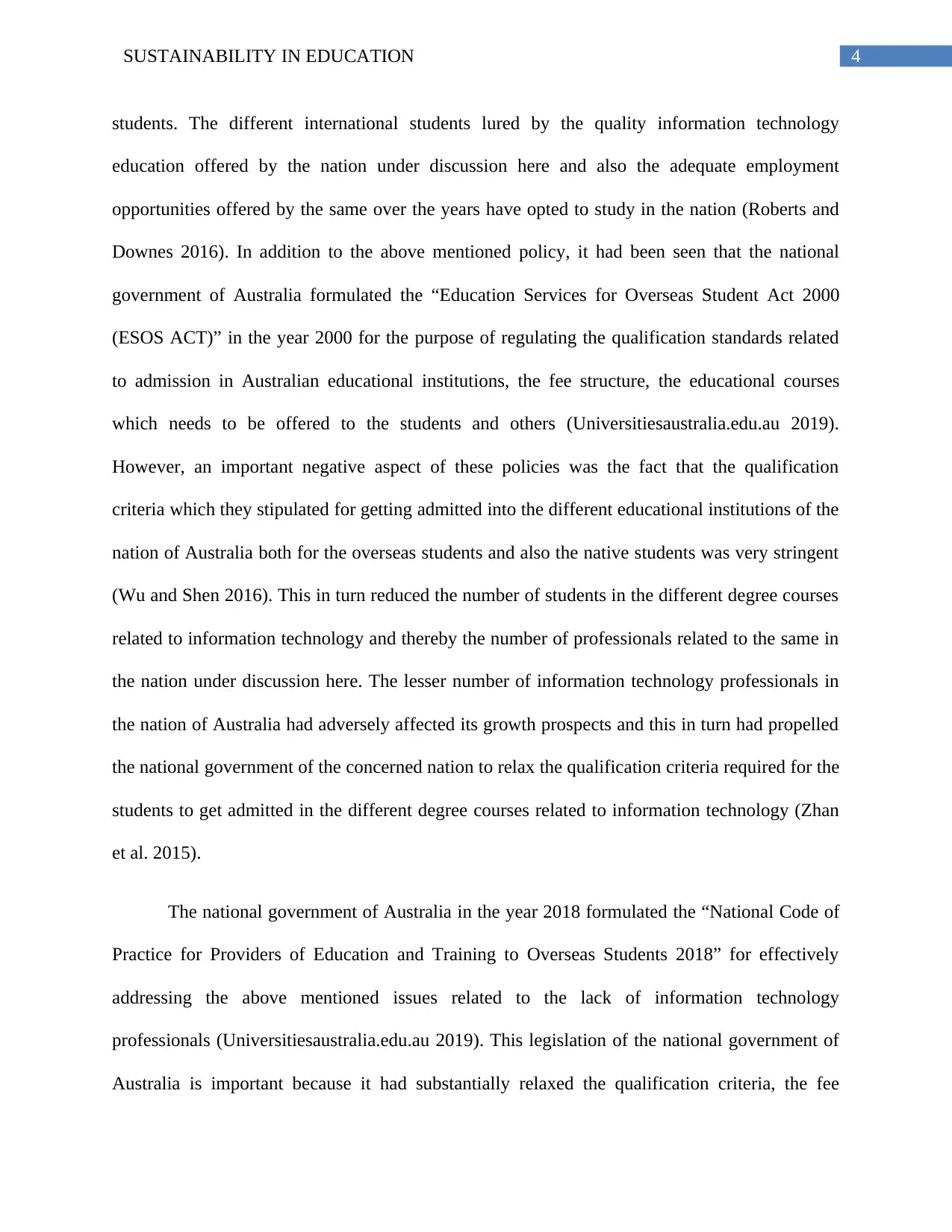
4SUSTAINABILITY IN EDUCATION
students. The different international students lured by the quality information technology
education offered by the nation under discussion here and also the adequate employment
opportunities offered by the same over the years have opted to study in the nation (Roberts and
Downes 2016). In addition to the above mentioned policy, it had been seen that the national
government of Australia formulated the “Education Services for Overseas Student Act 2000
(ESOS ACT)” in the year 2000 for the purpose of regulating the qualification standards related
to admission in Australian educational institutions, the fee structure, the educational courses
which needs to be offered to the students and others (Universitiesaustralia.edu.au 2019).
However, an important negative aspect of these policies was the fact that the qualification
criteria which they stipulated for getting admitted into the different educational institutions of the
nation of Australia both for the overseas students and also the native students was very stringent
(Wu and Shen 2016). This in turn reduced the number of students in the different degree courses
related to information technology and thereby the number of professionals related to the same in
the nation under discussion here. The lesser number of information technology professionals in
the nation of Australia had adversely affected its growth prospects and this in turn had propelled
the national government of the concerned nation to relax the qualification criteria required for the
students to get admitted in the different degree courses related to information technology (Zhan
et al. 2015).
The national government of Australia in the year 2018 formulated the “National Code of
Practice for Providers of Education and Training to Overseas Students 2018” for effectively
addressing the above mentioned issues related to the lack of information technology
professionals (Universitiesaustralia.edu.au 2019). This legislation of the national government of
Australia is important because it had substantially relaxed the qualification criteria, the fee
students. The different international students lured by the quality information technology
education offered by the nation under discussion here and also the adequate employment
opportunities offered by the same over the years have opted to study in the nation (Roberts and
Downes 2016). In addition to the above mentioned policy, it had been seen that the national
government of Australia formulated the “Education Services for Overseas Student Act 2000
(ESOS ACT)” in the year 2000 for the purpose of regulating the qualification standards related
to admission in Australian educational institutions, the fee structure, the educational courses
which needs to be offered to the students and others (Universitiesaustralia.edu.au 2019).
However, an important negative aspect of these policies was the fact that the qualification
criteria which they stipulated for getting admitted into the different educational institutions of the
nation of Australia both for the overseas students and also the native students was very stringent
(Wu and Shen 2016). This in turn reduced the number of students in the different degree courses
related to information technology and thereby the number of professionals related to the same in
the nation under discussion here. The lesser number of information technology professionals in
the nation of Australia had adversely affected its growth prospects and this in turn had propelled
the national government of the concerned nation to relax the qualification criteria required for the
students to get admitted in the different degree courses related to information technology (Zhan
et al. 2015).
The national government of Australia in the year 2018 formulated the “National Code of
Practice for Providers of Education and Training to Overseas Students 2018” for effectively
addressing the above mentioned issues related to the lack of information technology
professionals (Universitiesaustralia.edu.au 2019). This legislation of the national government of
Australia is important because it had substantially relaxed the qualification criteria, the fee
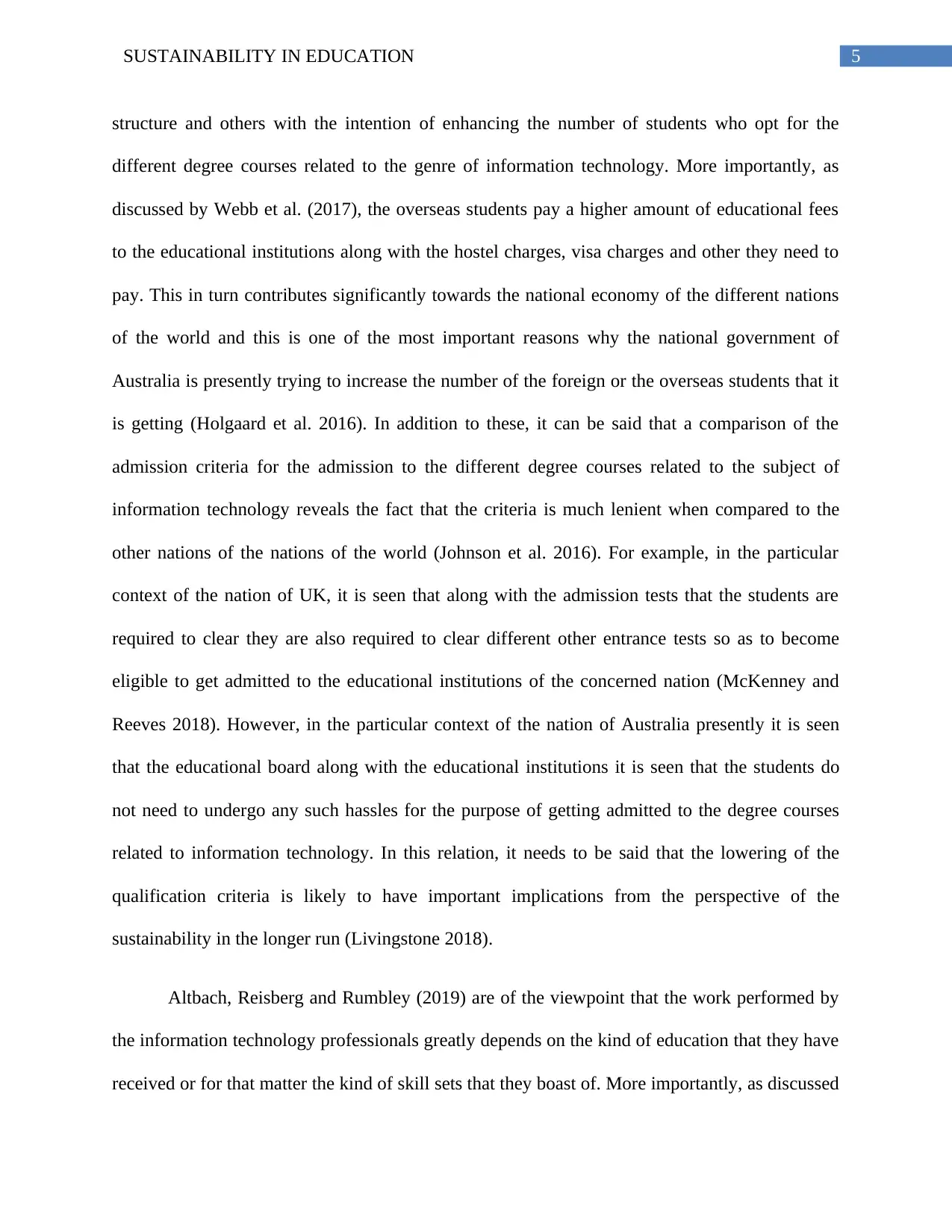
5SUSTAINABILITY IN EDUCATION
structure and others with the intention of enhancing the number of students who opt for the
different degree courses related to the genre of information technology. More importantly, as
discussed by Webb et al. (2017), the overseas students pay a higher amount of educational fees
to the educational institutions along with the hostel charges, visa charges and other they need to
pay. This in turn contributes significantly towards the national economy of the different nations
of the world and this is one of the most important reasons why the national government of
Australia is presently trying to increase the number of the foreign or the overseas students that it
is getting (Holgaard et al. 2016). In addition to these, it can be said that a comparison of the
admission criteria for the admission to the different degree courses related to the subject of
information technology reveals the fact that the criteria is much lenient when compared to the
other nations of the nations of the world (Johnson et al. 2016). For example, in the particular
context of the nation of UK, it is seen that along with the admission tests that the students are
required to clear they are also required to clear different other entrance tests so as to become
eligible to get admitted to the educational institutions of the concerned nation (McKenney and
Reeves 2018). However, in the particular context of the nation of Australia presently it is seen
that the educational board along with the educational institutions it is seen that the students do
not need to undergo any such hassles for the purpose of getting admitted to the degree courses
related to information technology. In this relation, it needs to be said that the lowering of the
qualification criteria is likely to have important implications from the perspective of the
sustainability in the longer run (Livingstone 2018).
Altbach, Reisberg and Rumbley (2019) are of the viewpoint that the work performed by
the information technology professionals greatly depends on the kind of education that they have
received or for that matter the kind of skill sets that they boast of. More importantly, as discussed
structure and others with the intention of enhancing the number of students who opt for the
different degree courses related to the genre of information technology. More importantly, as
discussed by Webb et al. (2017), the overseas students pay a higher amount of educational fees
to the educational institutions along with the hostel charges, visa charges and other they need to
pay. This in turn contributes significantly towards the national economy of the different nations
of the world and this is one of the most important reasons why the national government of
Australia is presently trying to increase the number of the foreign or the overseas students that it
is getting (Holgaard et al. 2016). In addition to these, it can be said that a comparison of the
admission criteria for the admission to the different degree courses related to the subject of
information technology reveals the fact that the criteria is much lenient when compared to the
other nations of the nations of the world (Johnson et al. 2016). For example, in the particular
context of the nation of UK, it is seen that along with the admission tests that the students are
required to clear they are also required to clear different other entrance tests so as to become
eligible to get admitted to the educational institutions of the concerned nation (McKenney and
Reeves 2018). However, in the particular context of the nation of Australia presently it is seen
that the educational board along with the educational institutions it is seen that the students do
not need to undergo any such hassles for the purpose of getting admitted to the degree courses
related to information technology. In this relation, it needs to be said that the lowering of the
qualification criteria is likely to have important implications from the perspective of the
sustainability in the longer run (Livingstone 2018).
Altbach, Reisberg and Rumbley (2019) are of the viewpoint that the work performed by
the information technology professionals greatly depends on the kind of education that they have
received or for that matter the kind of skill sets that they boast of. More importantly, as discussed
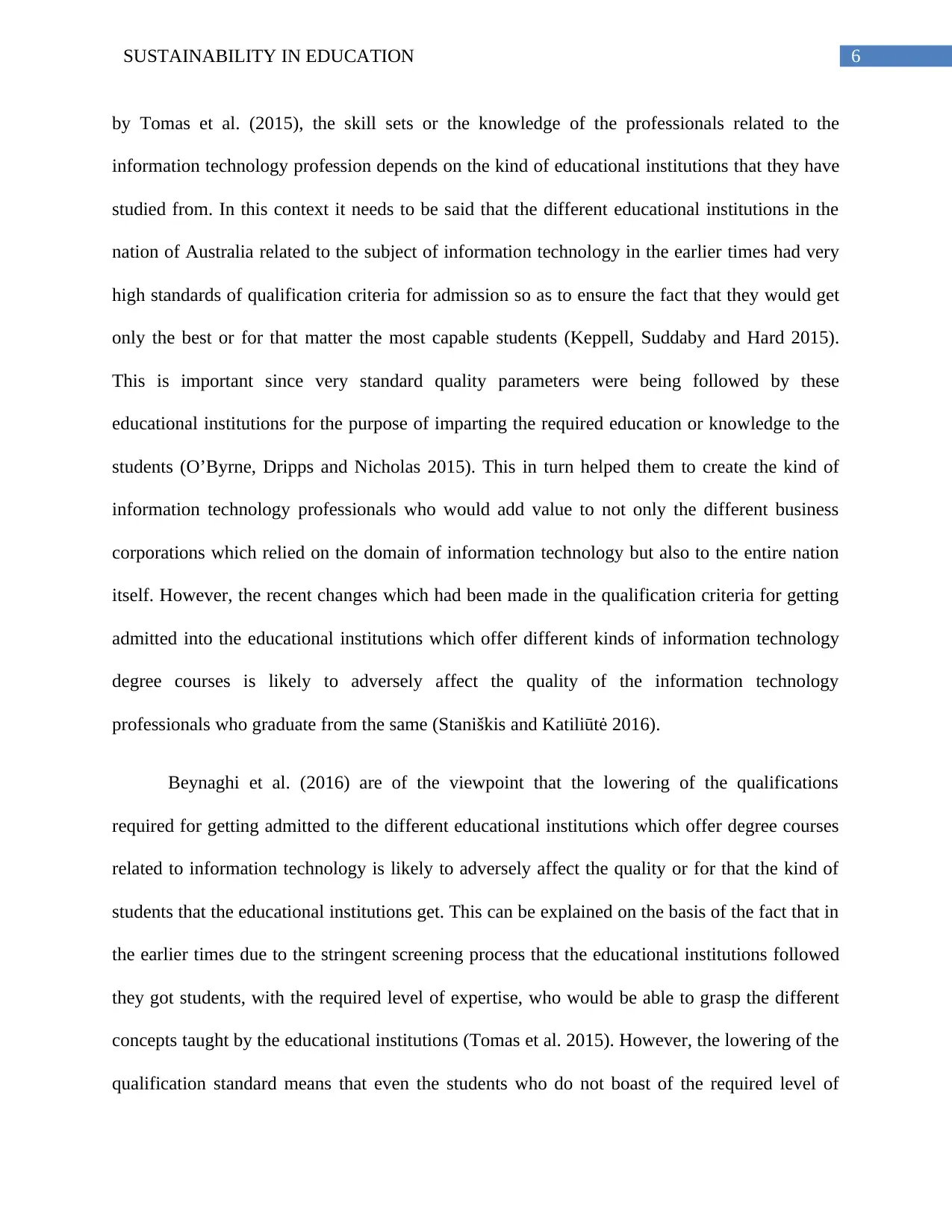
6SUSTAINABILITY IN EDUCATION
by Tomas et al. (2015), the skill sets or the knowledge of the professionals related to the
information technology profession depends on the kind of educational institutions that they have
studied from. In this context it needs to be said that the different educational institutions in the
nation of Australia related to the subject of information technology in the earlier times had very
high standards of qualification criteria for admission so as to ensure the fact that they would get
only the best or for that matter the most capable students (Keppell, Suddaby and Hard 2015).
This is important since very standard quality parameters were being followed by these
educational institutions for the purpose of imparting the required education or knowledge to the
students (O’Byrne, Dripps and Nicholas 2015). This in turn helped them to create the kind of
information technology professionals who would add value to not only the different business
corporations which relied on the domain of information technology but also to the entire nation
itself. However, the recent changes which had been made in the qualification criteria for getting
admitted into the educational institutions which offer different kinds of information technology
degree courses is likely to adversely affect the quality of the information technology
professionals who graduate from the same (Staniškis and Katiliūtė 2016).
Beynaghi et al. (2016) are of the viewpoint that the lowering of the qualifications
required for getting admitted to the different educational institutions which offer degree courses
related to information technology is likely to adversely affect the quality or for that the kind of
students that the educational institutions get. This can be explained on the basis of the fact that in
the earlier times due to the stringent screening process that the educational institutions followed
they got students, with the required level of expertise, who would be able to grasp the different
concepts taught by the educational institutions (Tomas et al. 2015). However, the lowering of the
qualification standard means that even the students who do not boast of the required level of
by Tomas et al. (2015), the skill sets or the knowledge of the professionals related to the
information technology profession depends on the kind of educational institutions that they have
studied from. In this context it needs to be said that the different educational institutions in the
nation of Australia related to the subject of information technology in the earlier times had very
high standards of qualification criteria for admission so as to ensure the fact that they would get
only the best or for that matter the most capable students (Keppell, Suddaby and Hard 2015).
This is important since very standard quality parameters were being followed by these
educational institutions for the purpose of imparting the required education or knowledge to the
students (O’Byrne, Dripps and Nicholas 2015). This in turn helped them to create the kind of
information technology professionals who would add value to not only the different business
corporations which relied on the domain of information technology but also to the entire nation
itself. However, the recent changes which had been made in the qualification criteria for getting
admitted into the educational institutions which offer different kinds of information technology
degree courses is likely to adversely affect the quality of the information technology
professionals who graduate from the same (Staniškis and Katiliūtė 2016).
Beynaghi et al. (2016) are of the viewpoint that the lowering of the qualifications
required for getting admitted to the different educational institutions which offer degree courses
related to information technology is likely to adversely affect the quality or for that the kind of
students that the educational institutions get. This can be explained on the basis of the fact that in
the earlier times due to the stringent screening process that the educational institutions followed
they got students, with the required level of expertise, who would be able to grasp the different
concepts taught by the educational institutions (Tomas et al. 2015). However, the lowering of the
qualification standard means that even the students who do not boast of the required level of
Paraphrase This Document
Need a fresh take? Get an instant paraphrase of this document with our AI Paraphraser
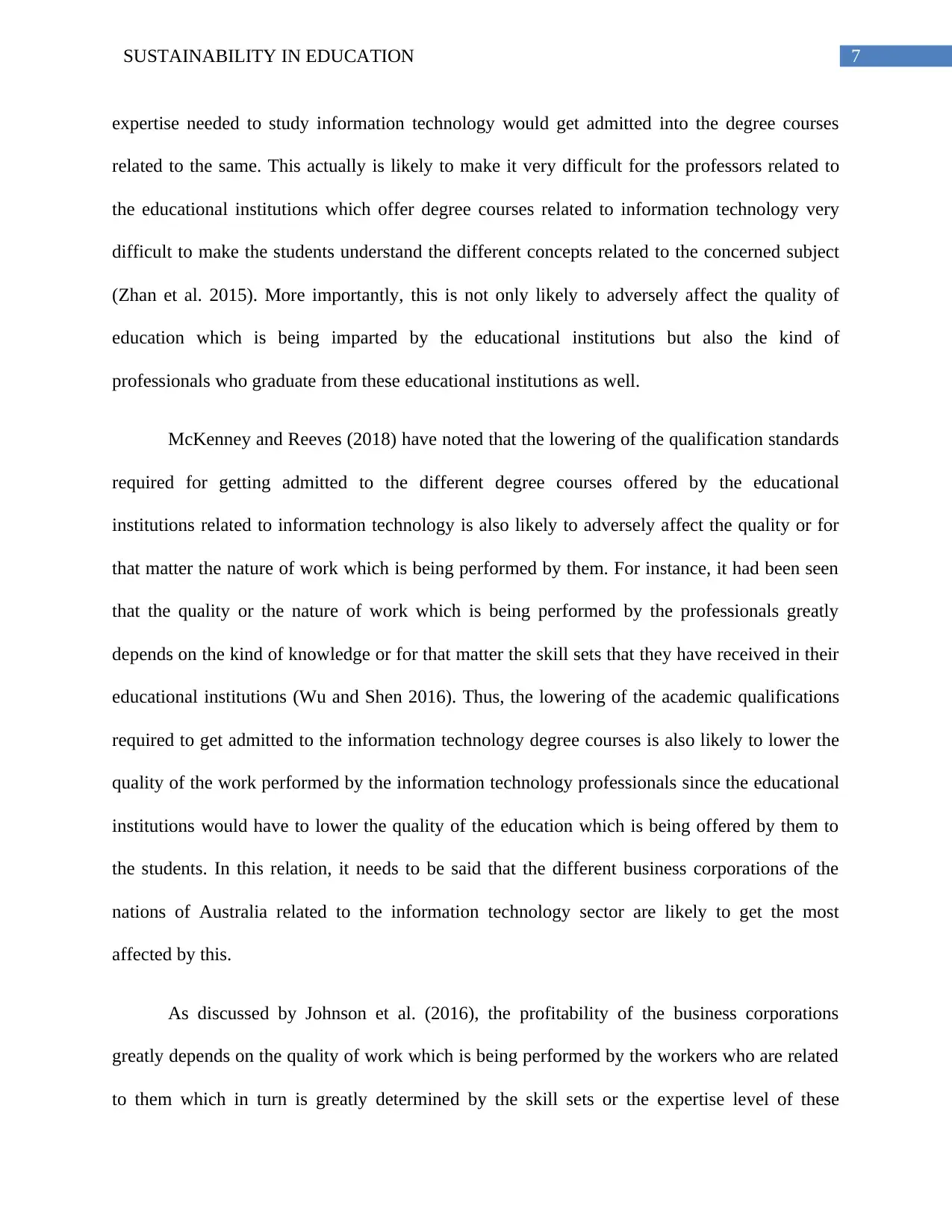
7SUSTAINABILITY IN EDUCATION
expertise needed to study information technology would get admitted into the degree courses
related to the same. This actually is likely to make it very difficult for the professors related to
the educational institutions which offer degree courses related to information technology very
difficult to make the students understand the different concepts related to the concerned subject
(Zhan et al. 2015). More importantly, this is not only likely to adversely affect the quality of
education which is being imparted by the educational institutions but also the kind of
professionals who graduate from these educational institutions as well.
McKenney and Reeves (2018) have noted that the lowering of the qualification standards
required for getting admitted to the different degree courses offered by the educational
institutions related to information technology is also likely to adversely affect the quality or for
that matter the nature of work which is being performed by them. For instance, it had been seen
that the quality or the nature of work which is being performed by the professionals greatly
depends on the kind of knowledge or for that matter the skill sets that they have received in their
educational institutions (Wu and Shen 2016). Thus, the lowering of the academic qualifications
required to get admitted to the information technology degree courses is also likely to lower the
quality of the work performed by the information technology professionals since the educational
institutions would have to lower the quality of the education which is being offered by them to
the students. In this relation, it needs to be said that the different business corporations of the
nations of Australia related to the information technology sector are likely to get the most
affected by this.
As discussed by Johnson et al. (2016), the profitability of the business corporations
greatly depends on the quality of work which is being performed by the workers who are related
to them which in turn is greatly determined by the skill sets or the expertise level of these
expertise needed to study information technology would get admitted into the degree courses
related to the same. This actually is likely to make it very difficult for the professors related to
the educational institutions which offer degree courses related to information technology very
difficult to make the students understand the different concepts related to the concerned subject
(Zhan et al. 2015). More importantly, this is not only likely to adversely affect the quality of
education which is being imparted by the educational institutions but also the kind of
professionals who graduate from these educational institutions as well.
McKenney and Reeves (2018) have noted that the lowering of the qualification standards
required for getting admitted to the different degree courses offered by the educational
institutions related to information technology is also likely to adversely affect the quality or for
that matter the nature of work which is being performed by them. For instance, it had been seen
that the quality or the nature of work which is being performed by the professionals greatly
depends on the kind of knowledge or for that matter the skill sets that they have received in their
educational institutions (Wu and Shen 2016). Thus, the lowering of the academic qualifications
required to get admitted to the information technology degree courses is also likely to lower the
quality of the work performed by the information technology professionals since the educational
institutions would have to lower the quality of the education which is being offered by them to
the students. In this relation, it needs to be said that the different business corporations of the
nations of Australia related to the information technology sector are likely to get the most
affected by this.
As discussed by Johnson et al. (2016), the profitability of the business corporations
greatly depends on the quality of work which is being performed by the workers who are related
to them which in turn is greatly determined by the skill sets or the expertise level of these
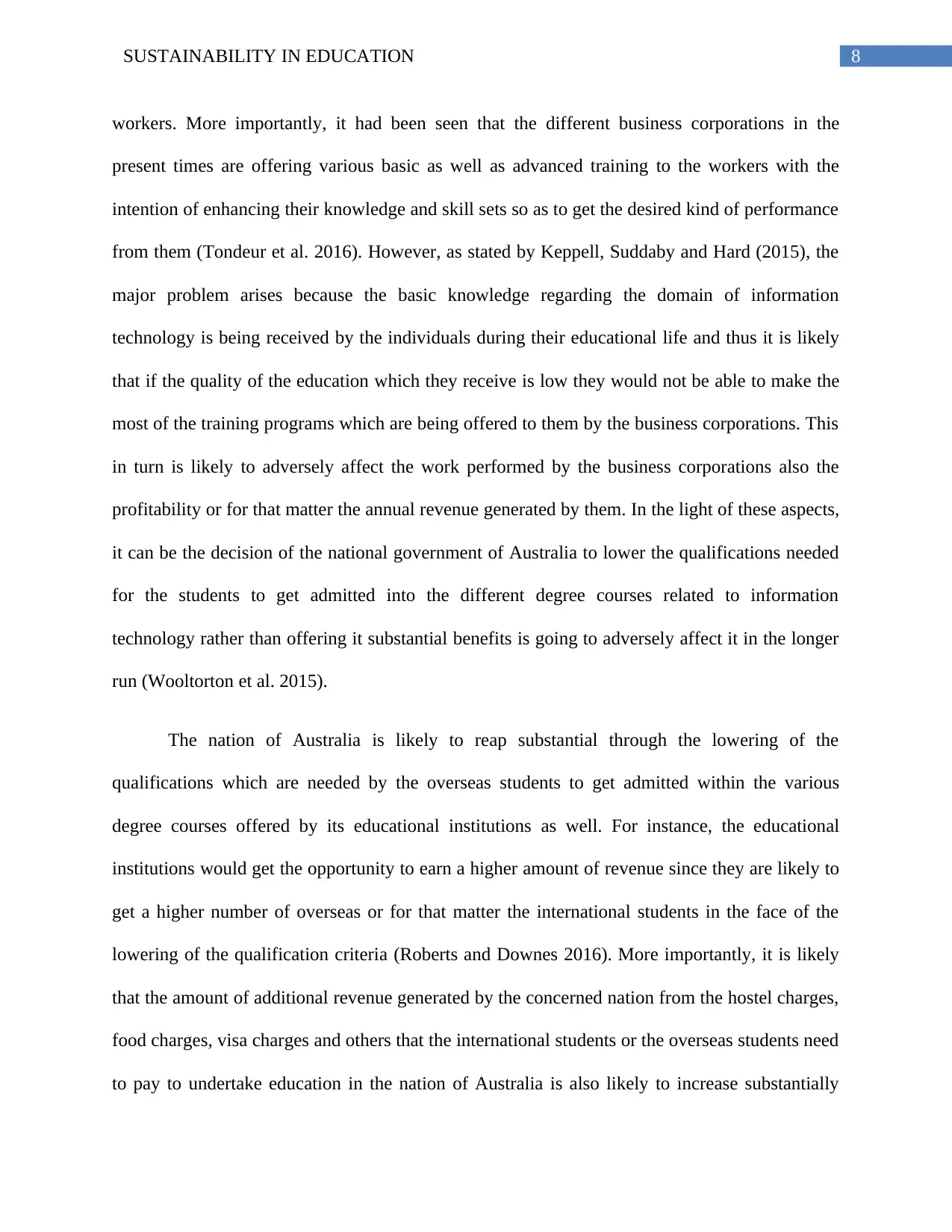
8SUSTAINABILITY IN EDUCATION
workers. More importantly, it had been seen that the different business corporations in the
present times are offering various basic as well as advanced training to the workers with the
intention of enhancing their knowledge and skill sets so as to get the desired kind of performance
from them (Tondeur et al. 2016). However, as stated by Keppell, Suddaby and Hard (2015), the
major problem arises because the basic knowledge regarding the domain of information
technology is being received by the individuals during their educational life and thus it is likely
that if the quality of the education which they receive is low they would not be able to make the
most of the training programs which are being offered to them by the business corporations. This
in turn is likely to adversely affect the work performed by the business corporations also the
profitability or for that matter the annual revenue generated by them. In the light of these aspects,
it can be the decision of the national government of Australia to lower the qualifications needed
for the students to get admitted into the different degree courses related to information
technology rather than offering it substantial benefits is going to adversely affect it in the longer
run (Wooltorton et al. 2015).
The nation of Australia is likely to reap substantial through the lowering of the
qualifications which are needed by the overseas students to get admitted within the various
degree courses offered by its educational institutions as well. For instance, the educational
institutions would get the opportunity to earn a higher amount of revenue since they are likely to
get a higher number of overseas or for that matter the international students in the face of the
lowering of the qualification criteria (Roberts and Downes 2016). More importantly, it is likely
that the amount of additional revenue generated by the concerned nation from the hostel charges,
food charges, visa charges and others that the international students or the overseas students need
to pay to undertake education in the nation of Australia is also likely to increase substantially
workers. More importantly, it had been seen that the different business corporations in the
present times are offering various basic as well as advanced training to the workers with the
intention of enhancing their knowledge and skill sets so as to get the desired kind of performance
from them (Tondeur et al. 2016). However, as stated by Keppell, Suddaby and Hard (2015), the
major problem arises because the basic knowledge regarding the domain of information
technology is being received by the individuals during their educational life and thus it is likely
that if the quality of the education which they receive is low they would not be able to make the
most of the training programs which are being offered to them by the business corporations. This
in turn is likely to adversely affect the work performed by the business corporations also the
profitability or for that matter the annual revenue generated by them. In the light of these aspects,
it can be the decision of the national government of Australia to lower the qualifications needed
for the students to get admitted into the different degree courses related to information
technology rather than offering it substantial benefits is going to adversely affect it in the longer
run (Wooltorton et al. 2015).
The nation of Australia is likely to reap substantial through the lowering of the
qualifications which are needed by the overseas students to get admitted within the various
degree courses offered by its educational institutions as well. For instance, the educational
institutions would get the opportunity to earn a higher amount of revenue since they are likely to
get a higher number of overseas or for that matter the international students in the face of the
lowering of the qualification criteria (Roberts and Downes 2016). More importantly, it is likely
that the amount of additional revenue generated by the concerned nation from the hostel charges,
food charges, visa charges and others that the international students or the overseas students need
to pay to undertake education in the nation of Australia is also likely to increase substantially
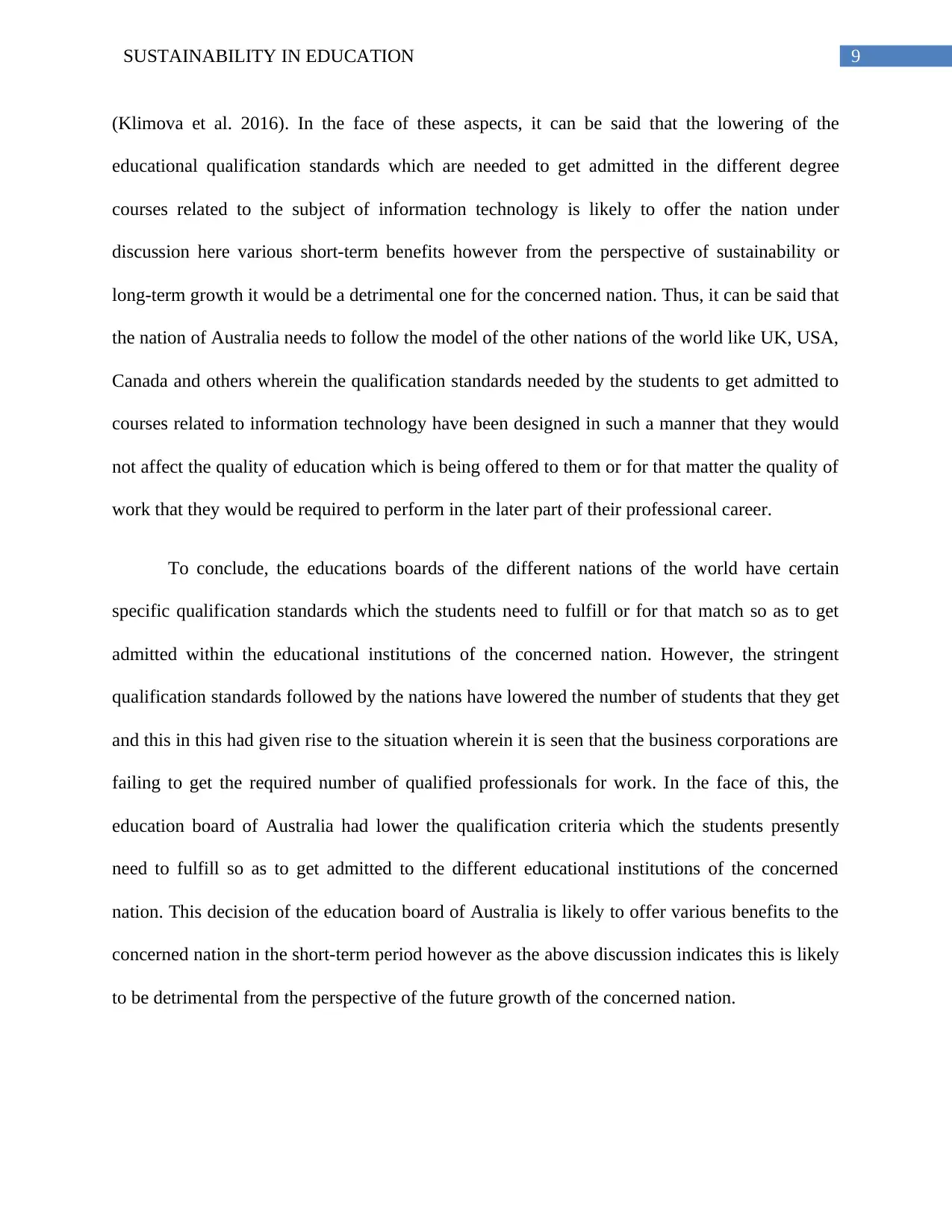
9SUSTAINABILITY IN EDUCATION
(Klimova et al. 2016). In the face of these aspects, it can be said that the lowering of the
educational qualification standards which are needed to get admitted in the different degree
courses related to the subject of information technology is likely to offer the nation under
discussion here various short-term benefits however from the perspective of sustainability or
long-term growth it would be a detrimental one for the concerned nation. Thus, it can be said that
the nation of Australia needs to follow the model of the other nations of the world like UK, USA,
Canada and others wherein the qualification standards needed by the students to get admitted to
courses related to information technology have been designed in such a manner that they would
not affect the quality of education which is being offered to them or for that matter the quality of
work that they would be required to perform in the later part of their professional career.
To conclude, the educations boards of the different nations of the world have certain
specific qualification standards which the students need to fulfill or for that match so as to get
admitted within the educational institutions of the concerned nation. However, the stringent
qualification standards followed by the nations have lowered the number of students that they get
and this in this had given rise to the situation wherein it is seen that the business corporations are
failing to get the required number of qualified professionals for work. In the face of this, the
education board of Australia had lower the qualification criteria which the students presently
need to fulfill so as to get admitted to the different educational institutions of the concerned
nation. This decision of the education board of Australia is likely to offer various benefits to the
concerned nation in the short-term period however as the above discussion indicates this is likely
to be detrimental from the perspective of the future growth of the concerned nation.
(Klimova et al. 2016). In the face of these aspects, it can be said that the lowering of the
educational qualification standards which are needed to get admitted in the different degree
courses related to the subject of information technology is likely to offer the nation under
discussion here various short-term benefits however from the perspective of sustainability or
long-term growth it would be a detrimental one for the concerned nation. Thus, it can be said that
the nation of Australia needs to follow the model of the other nations of the world like UK, USA,
Canada and others wherein the qualification standards needed by the students to get admitted to
courses related to information technology have been designed in such a manner that they would
not affect the quality of education which is being offered to them or for that matter the quality of
work that they would be required to perform in the later part of their professional career.
To conclude, the educations boards of the different nations of the world have certain
specific qualification standards which the students need to fulfill or for that match so as to get
admitted within the educational institutions of the concerned nation. However, the stringent
qualification standards followed by the nations have lowered the number of students that they get
and this in this had given rise to the situation wherein it is seen that the business corporations are
failing to get the required number of qualified professionals for work. In the face of this, the
education board of Australia had lower the qualification criteria which the students presently
need to fulfill so as to get admitted to the different educational institutions of the concerned
nation. This decision of the education board of Australia is likely to offer various benefits to the
concerned nation in the short-term period however as the above discussion indicates this is likely
to be detrimental from the perspective of the future growth of the concerned nation.
Secure Best Marks with AI Grader
Need help grading? Try our AI Grader for instant feedback on your assignments.
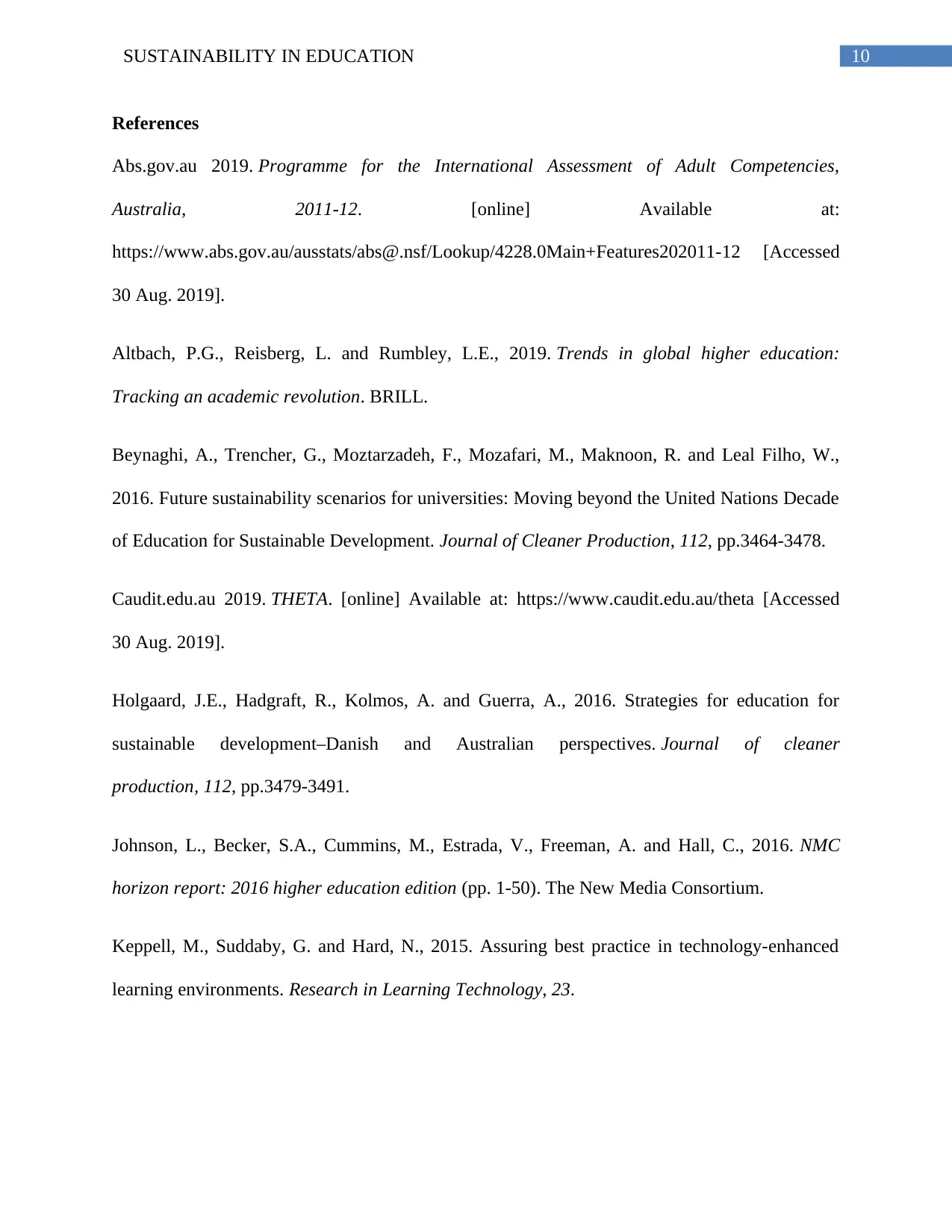
10SUSTAINABILITY IN EDUCATION
References
Abs.gov.au 2019. Programme for the International Assessment of Adult Competencies,
Australia, 2011-12. [online] Available at:
https://www.abs.gov.au/ausstats/abs@.nsf/Lookup/4228.0Main+Features202011-12 [Accessed
30 Aug. 2019].
Altbach, P.G., Reisberg, L. and Rumbley, L.E., 2019. Trends in global higher education:
Tracking an academic revolution. BRILL.
Beynaghi, A., Trencher, G., Moztarzadeh, F., Mozafari, M., Maknoon, R. and Leal Filho, W.,
2016. Future sustainability scenarios for universities: Moving beyond the United Nations Decade
of Education for Sustainable Development. Journal of Cleaner Production, 112, pp.3464-3478.
Caudit.edu.au 2019. THETA. [online] Available at: https://www.caudit.edu.au/theta [Accessed
30 Aug. 2019].
Holgaard, J.E., Hadgraft, R., Kolmos, A. and Guerra, A., 2016. Strategies for education for
sustainable development–Danish and Australian perspectives. Journal of cleaner
production, 112, pp.3479-3491.
Johnson, L., Becker, S.A., Cummins, M., Estrada, V., Freeman, A. and Hall, C., 2016. NMC
horizon report: 2016 higher education edition (pp. 1-50). The New Media Consortium.
Keppell, M., Suddaby, G. and Hard, N., 2015. Assuring best practice in technology-enhanced
learning environments. Research in Learning Technology, 23.
References
Abs.gov.au 2019. Programme for the International Assessment of Adult Competencies,
Australia, 2011-12. [online] Available at:
https://www.abs.gov.au/ausstats/abs@.nsf/Lookup/4228.0Main+Features202011-12 [Accessed
30 Aug. 2019].
Altbach, P.G., Reisberg, L. and Rumbley, L.E., 2019. Trends in global higher education:
Tracking an academic revolution. BRILL.
Beynaghi, A., Trencher, G., Moztarzadeh, F., Mozafari, M., Maknoon, R. and Leal Filho, W.,
2016. Future sustainability scenarios for universities: Moving beyond the United Nations Decade
of Education for Sustainable Development. Journal of Cleaner Production, 112, pp.3464-3478.
Caudit.edu.au 2019. THETA. [online] Available at: https://www.caudit.edu.au/theta [Accessed
30 Aug. 2019].
Holgaard, J.E., Hadgraft, R., Kolmos, A. and Guerra, A., 2016. Strategies for education for
sustainable development–Danish and Australian perspectives. Journal of cleaner
production, 112, pp.3479-3491.
Johnson, L., Becker, S.A., Cummins, M., Estrada, V., Freeman, A. and Hall, C., 2016. NMC
horizon report: 2016 higher education edition (pp. 1-50). The New Media Consortium.
Keppell, M., Suddaby, G. and Hard, N., 2015. Assuring best practice in technology-enhanced
learning environments. Research in Learning Technology, 23.
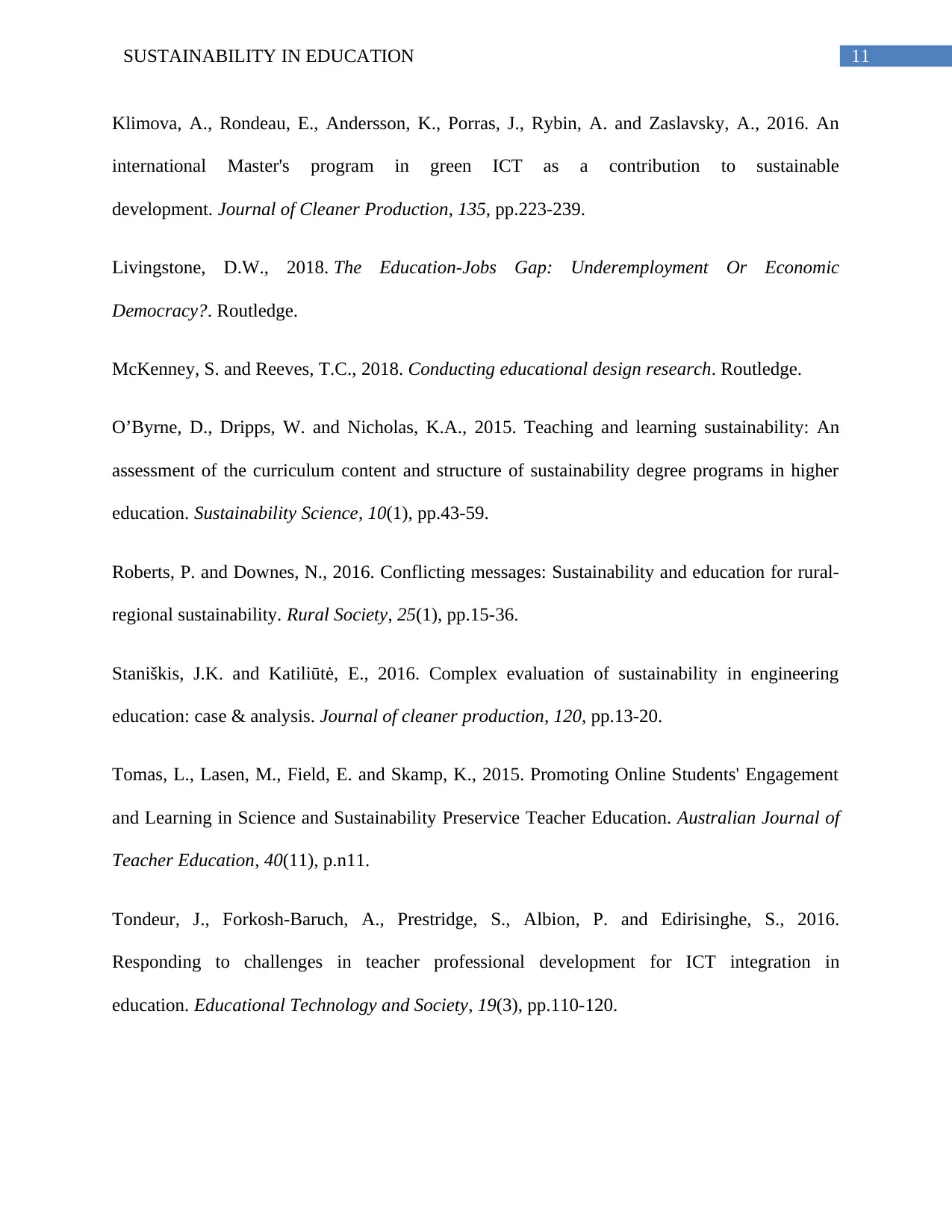
11SUSTAINABILITY IN EDUCATION
Klimova, A., Rondeau, E., Andersson, K., Porras, J., Rybin, A. and Zaslavsky, A., 2016. An
international Master's program in green ICT as a contribution to sustainable
development. Journal of Cleaner Production, 135, pp.223-239.
Livingstone, D.W., 2018. The Education-Jobs Gap: Underemployment Or Economic
Democracy?. Routledge.
McKenney, S. and Reeves, T.C., 2018. Conducting educational design research. Routledge.
O’Byrne, D., Dripps, W. and Nicholas, K.A., 2015. Teaching and learning sustainability: An
assessment of the curriculum content and structure of sustainability degree programs in higher
education. Sustainability Science, 10(1), pp.43-59.
Roberts, P. and Downes, N., 2016. Conflicting messages: Sustainability and education for rural-
regional sustainability. Rural Society, 25(1), pp.15-36.
Staniškis, J.K. and Katiliūtė, E., 2016. Complex evaluation of sustainability in engineering
education: case & analysis. Journal of cleaner production, 120, pp.13-20.
Tomas, L., Lasen, M., Field, E. and Skamp, K., 2015. Promoting Online Students' Engagement
and Learning in Science and Sustainability Preservice Teacher Education. Australian Journal of
Teacher Education, 40(11), p.n11.
Tondeur, J., Forkosh-Baruch, A., Prestridge, S., Albion, P. and Edirisinghe, S., 2016.
Responding to challenges in teacher professional development for ICT integration in
education. Educational Technology and Society, 19(3), pp.110-120.
Klimova, A., Rondeau, E., Andersson, K., Porras, J., Rybin, A. and Zaslavsky, A., 2016. An
international Master's program in green ICT as a contribution to sustainable
development. Journal of Cleaner Production, 135, pp.223-239.
Livingstone, D.W., 2018. The Education-Jobs Gap: Underemployment Or Economic
Democracy?. Routledge.
McKenney, S. and Reeves, T.C., 2018. Conducting educational design research. Routledge.
O’Byrne, D., Dripps, W. and Nicholas, K.A., 2015. Teaching and learning sustainability: An
assessment of the curriculum content and structure of sustainability degree programs in higher
education. Sustainability Science, 10(1), pp.43-59.
Roberts, P. and Downes, N., 2016. Conflicting messages: Sustainability and education for rural-
regional sustainability. Rural Society, 25(1), pp.15-36.
Staniškis, J.K. and Katiliūtė, E., 2016. Complex evaluation of sustainability in engineering
education: case & analysis. Journal of cleaner production, 120, pp.13-20.
Tomas, L., Lasen, M., Field, E. and Skamp, K., 2015. Promoting Online Students' Engagement
and Learning in Science and Sustainability Preservice Teacher Education. Australian Journal of
Teacher Education, 40(11), p.n11.
Tondeur, J., Forkosh-Baruch, A., Prestridge, S., Albion, P. and Edirisinghe, S., 2016.
Responding to challenges in teacher professional development for ICT integration in
education. Educational Technology and Society, 19(3), pp.110-120.
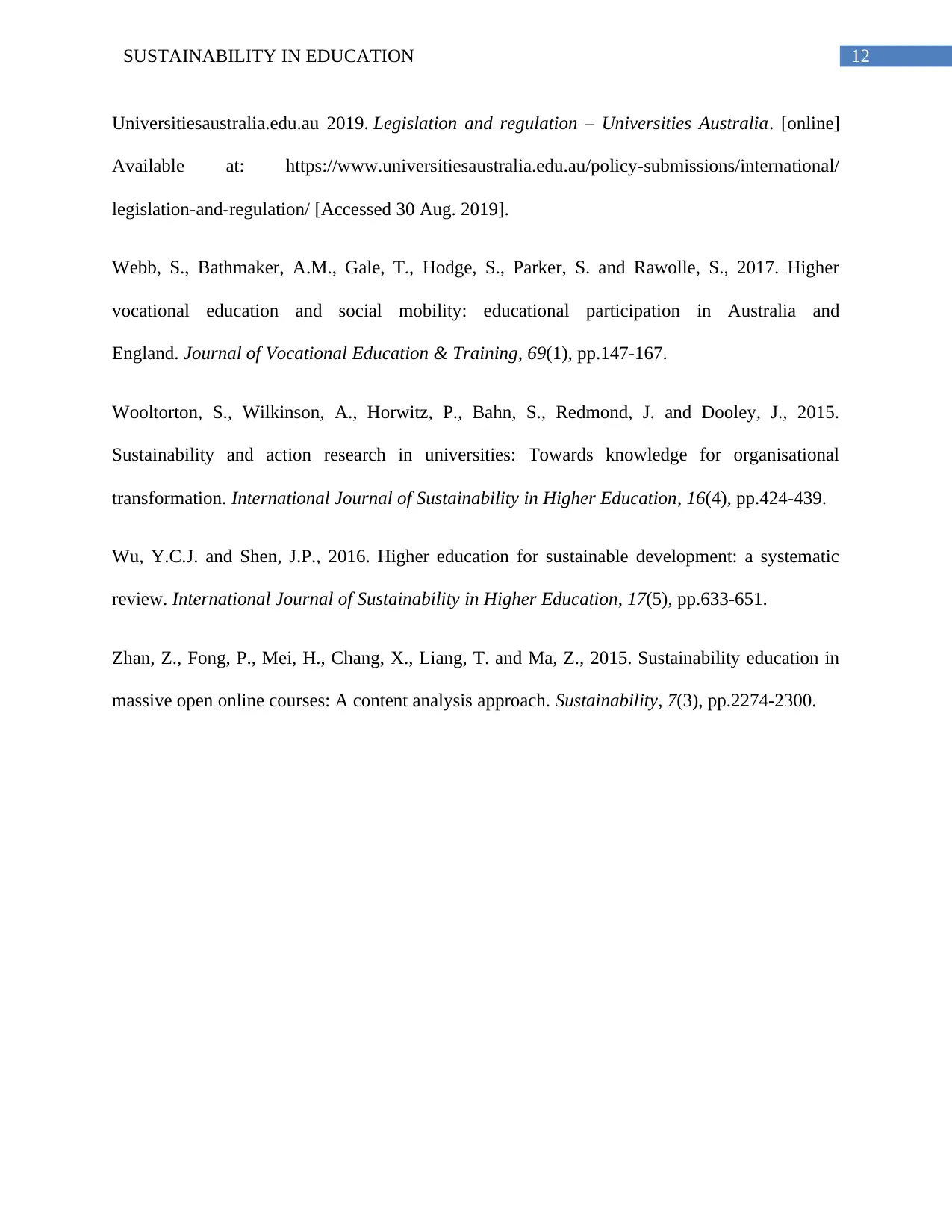
12SUSTAINABILITY IN EDUCATION
Universitiesaustralia.edu.au 2019. Legislation and regulation – Universities Australia. [online]
Available at: https://www.universitiesaustralia.edu.au/policy-submissions/international/
legislation-and-regulation/ [Accessed 30 Aug. 2019].
Webb, S., Bathmaker, A.M., Gale, T., Hodge, S., Parker, S. and Rawolle, S., 2017. Higher
vocational education and social mobility: educational participation in Australia and
England. Journal of Vocational Education & Training, 69(1), pp.147-167.
Wooltorton, S., Wilkinson, A., Horwitz, P., Bahn, S., Redmond, J. and Dooley, J., 2015.
Sustainability and action research in universities: Towards knowledge for organisational
transformation. International Journal of Sustainability in Higher Education, 16(4), pp.424-439.
Wu, Y.C.J. and Shen, J.P., 2016. Higher education for sustainable development: a systematic
review. International Journal of Sustainability in Higher Education, 17(5), pp.633-651.
Zhan, Z., Fong, P., Mei, H., Chang, X., Liang, T. and Ma, Z., 2015. Sustainability education in
massive open online courses: A content analysis approach. Sustainability, 7(3), pp.2274-2300.
Universitiesaustralia.edu.au 2019. Legislation and regulation – Universities Australia. [online]
Available at: https://www.universitiesaustralia.edu.au/policy-submissions/international/
legislation-and-regulation/ [Accessed 30 Aug. 2019].
Webb, S., Bathmaker, A.M., Gale, T., Hodge, S., Parker, S. and Rawolle, S., 2017. Higher
vocational education and social mobility: educational participation in Australia and
England. Journal of Vocational Education & Training, 69(1), pp.147-167.
Wooltorton, S., Wilkinson, A., Horwitz, P., Bahn, S., Redmond, J. and Dooley, J., 2015.
Sustainability and action research in universities: Towards knowledge for organisational
transformation. International Journal of Sustainability in Higher Education, 16(4), pp.424-439.
Wu, Y.C.J. and Shen, J.P., 2016. Higher education for sustainable development: a systematic
review. International Journal of Sustainability in Higher Education, 17(5), pp.633-651.
Zhan, Z., Fong, P., Mei, H., Chang, X., Liang, T. and Ma, Z., 2015. Sustainability education in
massive open online courses: A content analysis approach. Sustainability, 7(3), pp.2274-2300.
1 out of 13
Related Documents
Your All-in-One AI-Powered Toolkit for Academic Success.
+13062052269
info@desklib.com
Available 24*7 on WhatsApp / Email
![[object Object]](/_next/static/media/star-bottom.7253800d.svg)
Unlock your academic potential
© 2024 | Zucol Services PVT LTD | All rights reserved.





